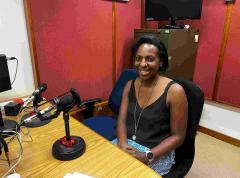简介
Listen to #Hashtag Hong Kong every Sunday morning at 8.15
Focussing on issues affecting civil society, we'll hear from representatives of NGOs, associations, statutory bodies, and non-profit groups.
(Sundays 8.15am - 8.25am)
最新

Cheryl Yip , Advocacy Officer in Rainlily
In Hong Kong, the issue of sexual violence is frequently overlooked and inadequately discussed. A 2021 local survey revealed that 1-in-3 women has experienced some form of sexual violence in their lifetime. This indifference to the alarming prevalence of sexual violence fosters an environment where victim-survivors struggle to find the support they desperately need. Many encounter a culture of disbelief, stigma, and victim-blaming, which causes further trauma. As a result, individuals often hesitate to report incidents, fearing they will not be taken seriously or doubting that justice can be achieved through the legal system. It often took immense courage for sexual violence victim-survivors to come forward and disclose their experiences. Many stood up not only for themselves, but also to ensure that others do not have to suffer the same fate. Yet, time and again, our criminal justice system fails these courageous women, leaving them feeling betrayed and unheard in their quest for justice.
Many of Hong Kong’s sexual offences are based on legislation from the 1970s, which in turn was based on even earlier English laws. The definition of rape, for example, remains narrowly defined as non-consensual penile-vaginal penetration, reflecting outdated understandings of sexual violence. Even the English sexual offences have seen a major overhaul in the early 2000s. Hong Kong’s ancient legal framework fails to adequately protect victim-survivors and creates significant barriers to justice. The latest 5-year review of service data from RainLily, reveals a staggering statistic: in the sexual violence crisis centre’s known result, for every 100 cases reported to the police, only 6 have seen the accused convicted in the first trial. These numbers starkly illustrate the inadequacy of our legal system in delivering justice for victim-survivors and holding perpetrators accountable for their actions.
A particularly outdated and problematic aspect of Hong Kong’s sexual offenses is the defence of “genuine but mistaken belief,” which absurdly permits the perpetrator's subjective belief to override the victim's consent, even when that belief is clearly unreasonable. This led to victim-blaming and abusive questioning in the courtroom which reinforces harmful stereotypes about sexual violence. The lack of resistance, victim’s clothing and behaviour, relationship context etc are often intentionally misinterpreted by the defence counsel as sending a “mixed signal” to the accused which led to so-called “misunderstanding”. The persistence of the use of rape myths as grounds for acquittal is both frustrating and profoundly unjust.
The experiences of victim-survivors highlight the urgent need for a clearer understanding of consent within the legal framework, as recommended by the Law Reform Commission in 2019. In the past and within the current context of Hong Kong’s courts, the concept of consent has often been seen as a door that is always open. It was the victim’s responsibility to demonstrated they had said ‘no’ vigorously to prevent sexual assault from happening. This outdated and harmful perspective places the burden on the victim and perpetuates a culture where sexual violence can thrive. Far too often, victims are asked to explain why they were victimized, while the perpetrators escape accountability for their actions, as if it were a matter of course. This must change. Instead of placing the burden on victims to justify their experiences, we must hold perpetrators accountable for their actions. Shame must change side.
In today’s evolving cultural context, there is a growing recognition that consent is not a passive state but an active and ongoing process. We are shifting to an understanding of consent as a door that is always closed. It is the responsibility of the person initiating sexual activity to “knock” and obtain clear and affirmative consent before proceeding. This means actively seeking a clear and enthusiastic “yes” and ensuring that consent is freely and voluntarily given.
Since the Law Reform Commission conducted its consultation on ‘rape and other non-consensual sexual offences’ 13 years ago, many places have moved further to advance protection for victims in the goal of encouraging reporting and reducing the traumatisation and rape myths that swim through the criminal justice system. In Australia, multiple jurisdictions have implemented that any belief in consent will not be reasonable if the accused did not say or do anything to ascertain consent. This shift in focus from the victim’s actions or inactions to the defendant’s behaviour is crucial in ensuring that consent cannot be assumed.
重温






















